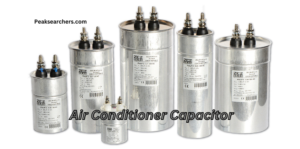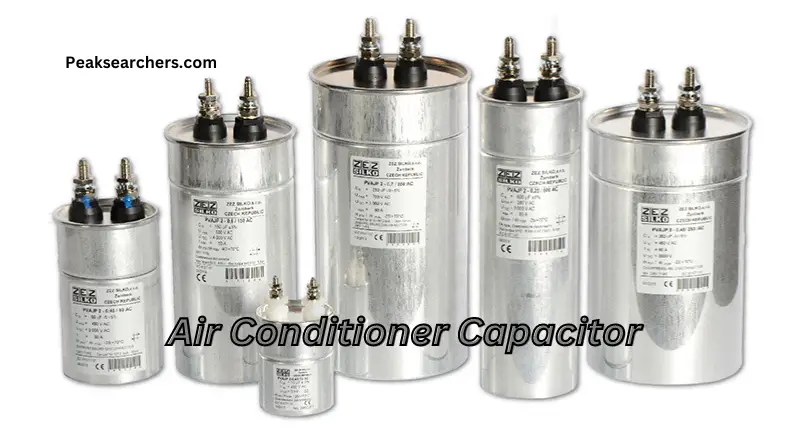What Does An Air Conditioner Capacitor Do? A Detailed Answer
An air conditioner capacitor plays a crucial role in the functioning of an air conditioning unit. It is responsible for providing the necessary energy to start and run the motor that powers the compressor. Without a properly functioning capacitor, your AC unit will not be able to cool your home or office effectively.
Capacitors can fail due to age, wear, and tear, or electrical issues. When this happens, you may notice that your AC unit is blowing warm air instead of cool air or that it won’t turn on at all. In some cases, a faulty capacitor can also cause damage to other parts of your AC system.
In the beginning, I did not know the importance of a capacitor but as soon as I researched about it, I was amazed that there are this many functions of a capacitor.

Explaining the importance of air conditioner capacitors
An air conditioner capacitor is an essential component of an AC unit that provides the needed electrical energy to start the compressor and fan motors.
Capacitors store and release energy, which helps in regulating voltage fluctuations and ensures the smooth operation of the AC system. Without capacitors, your air conditioner will not be able to function correctly.
Capacitors are subject to wear and tear over time, which can lead to reduced efficiency or complete failure. Signs of a faulty capacitor include trouble starting your AC or frequent shut-offs. In such cases, it’s crucial to replace the capacitor as soon as possible; otherwise, it could cause further damage to other components.
In summary, air conditioner capacitors play a key role in ensuring the optimal performance of your AC unit. Regular maintenance checks can help identify any issues with your capacitor early on and prevent costly repairs down the road.
What is an air conditioner capacitor?
An air conditioner capacitor is a component of an HVAC system that stores and releases electrical energy to power the motor in the compressor.
The capacitor works by taking in voltage from the main supply and storing it temporarily. When the motor needs to start, the capacitor sends out a jolt of energy to give it a boost, which helps it overcome inertia and begin spinning.
There are two main types of capacitors used in air conditioning systems: run capacitors and start capacitors. Run capacitors provide a continuous flow of electricity to keep the motor running smoothly, while start capacitors deliver an extra burst of power needed during startup.
If your AC unit is not working properly, one potential culprit could be a faulty capacitor. Symptoms include difficulty starting up or turning off immediately after being turned on. In this case, it’s important to have an experienced professional diagnose and repair any issues with your HVAC system for optimal performance and longevity.
Defining what a capacitor is and its function in AC systems
A capacitor is generally an electronic component that stores and releases electrical energy in a circuit. It sometimes consists of two metal plates separated by an insulating material which is called a dielectric. Capacitors can store electrical charges for a short duration and then release them when required.
In air conditioning systems, the capacitor is used to provide additional starting power for the compressor and fan motors. When the AC unit starts up, it requires more energy than it does during normal operation. The capacitor provides this extra boost by storing up a charge and releasing it to start the motors.
Without a functioning capacitor in an AC system, the compressor may not start or may struggle to turn on. This can lead to poor performance or complete system failure over time. Regular maintenance of capacitors can help prevent issues with your AC unit and ensure optimal performance year-round.
Types of air conditioner capacitors
An air conditioner capacitor is an electrical component that stores and releases energy. It does this to help start the compressor and fan motors. There are three types of air conditioner capacitors: run, start, and dual capacitors.
Run capacitors are designed to provide a boost of energy to keep the motor running smoothly during operation. They are usually installed in the outdoor unit and have a higher capacitance rating than start capacitors.
Start capacitors, on the other hand, provide an extra jolt of power to get the motor started. They can be found in both indoor and outdoor units and tend to have lower capacitance ratings than run capacitors.
Dual capacitors combine both run and start capacitor functions into one unit. They typically feature two sets of terminals for separate wiring connections.
It is important to note that not all air conditioners use all three types of capacitors, as different models may require different components depending on their design or specifications. Regular maintenance checks by a qualified technician can ensure that all components are working properly and efficiently.
Signs of a faulty capacitor
One of the most common issues that homeowners face when it comes to their air conditioning units is a faulty capacitor.
A capacitor is an important component of an AC unit as it helps to store and release energy, which is crucial for the functioning of the compressor and fan motor. If your AC unit starts showing signs of a faulty capacitor, then it’s important to address the issue right away.
One sign that your capacitor may be faulty is if you notice that your AC unit takes longer than usual to start up or even fails to start altogether. This could indicate that there isn’t enough energy being stored in the capacitor, which means that there won’t be enough power to start up the compressor and fan motor.
Another sign is if you hear strange noises coming from your AC unit, such as buzzing or humming sounds, as this could indicate that there’s an electrical issue with the capacitor.
Lastly, another sign of a faulty capacitor is if you notice that your AC unit isn’t cooling your home as efficiently as it used to. This could mean that the compressor and fan motor aren’t receiving enough power due to the lack of energy being stored in the capacitor.
If you notice any of these signs, then it’s best to call in a professional HVAC technician who can diagnose and fix any issues with your air conditioner’s capacitors promptly.
Step-by-step instructions for testing and replacing a bad capacitor
An air conditioner capacitor is an essential component of your AC unit. It stores electrical energy and releases it when needed to start the compressor and fan motors. If you notice that your AC is not running correctly, it could be a sign of a bad capacitor. To test the capacitor, you will need a multimeter tool that can measure capacitance.
First, turn off the power supply to your AC unit by switching off the circuit breaker. Then locate the capacitor usually found on the outside unit near the compressor motor and fan blades. Carefully discharge any remaining charge in the capacitor with an insulated screwdriver or resistor before testing it.
Using a multimeter set to capacitance mode, connect its probes to each terminal of your capacitor while taking note of its reading value. If this value falls below 90 percent of its rated capacitance value, then it’s time for a replacement.
When replacing a bad capacitor, ensure you choose one with similar voltage ratings and microfarad capacity as recommended by your manufacturer’s specifications.
FAQ’s
Q: What is an air conditioner capacitor, and what does it do?
A: An air conditioner capacitor is an electrical component that stores energy in an electrostatic field. It is used to provide the initial boost of power needed to start the compressor motor, which then powers the rest of the system. The capacitor also helps regulate voltage levels and provides a stable current flow.
Q: How can you tell if your air conditioner capacitor needs replacing?
A: If your AC unit is taking longer than usual to start up, or if it makes a humming noise but doesn’t turn on at all, there’s a good chance that the capacitor has gone bad. You may also notice that your system isn’t cooling as effectively as before or blowing warm air instead of cold.
Q: Can I replace my air conditioner capacitor myself?
A: It’s generally not recommended for homeowners to attempt DIY repairs on their HVAC systems. They do this unless they have extensive experience and training in this area. Capacitors store electrical charges even when unplugged, which could pose a serious safety risk if mishandled. Always consult with a licensed professional technician before attempting any kind of repair work on your AC unit.
Also read: How Do You Protect An Air Conditioner In The Winter? A Step By Step Guide
Conclusion
In conclusion, the air conditioner capacitor is an essential component in the overall functionality of your AC system. It stores and releases energy to start the compressor motor and keep it running efficiently. Without a functioning capacitor, your AC unit may fail to start or experience reduced performance levels.
Regular maintenance and inspections can help identify any issues with the capacitor before they result in more significant problems that require costly repairs or replacements. If you notice any signs of a faulty capacitor, such as unusual noises or difficulty starting up, it’s critical to address them promptly by calling a professional technician.
Overall, understanding how your air conditioner capacitor works can help you maintain optimal performance levels for your cooling system while also prolonging its lifespan.
By following these tips and taking proactive measures to care for your AC unit, you can enjoy cool comfort throughout even the hottest months of the year without worrying about breakdowns or other issues.


